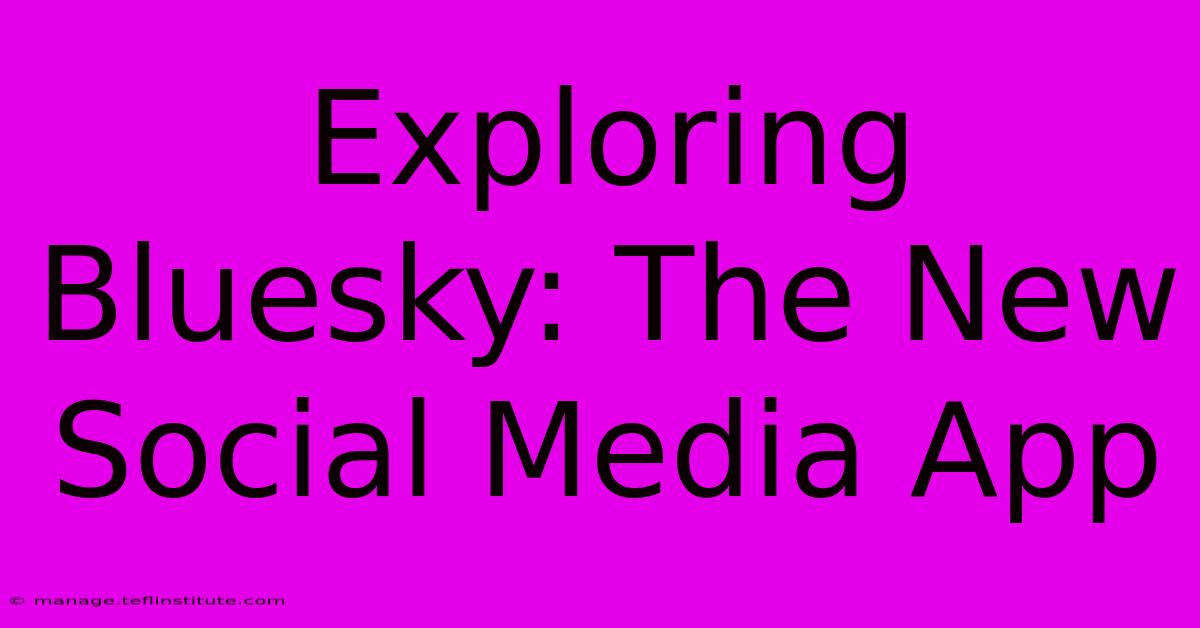Exploring Bluesky: The New Social Media App

Table of Contents
Exploring Bluesky: The New Social Media App Aiming for Decentralization
The social media landscape is constantly evolving, and a new contender has emerged, vying for a slice of the user base. Bluesky, a decentralized social network developed by Jack Dorsey, the co-founder of Twitter, is attracting attention for its ambitious vision of a more user-controlled internet.
What is Bluesky?
Bluesky isn't your typical social media platform. It operates on a different principle, aiming to be a decentralized social network. This means that rather than being controlled by a single company, the network is run by a distributed group of users and developers.
Key Features:
- Decentralized Architecture: Bluesky's core is built on the AT Protocol, an open and standardized protocol that allows for interoperability between different social media platforms. This allows users to own their data and seamlessly switch between platforms, unlike traditional walled gardens.
- Content Moderation: Bluesky is designed to be more transparent and democratic in its content moderation. The platform is envisioned as a community-driven system, where users can contribute to defining and enforcing community guidelines.
- Open Source: The entire platform is open source, meaning developers and users can freely contribute to its development. This fosters a collaborative environment and ensures transparency in the platform's operations.
The Promise of Decentralization:
Bluesky aims to address some of the criticisms levied at centralized social networks, such as:
- Data Ownership: Users have limited control over their data, which is often used for targeted advertising and profiling.
- Censorship and Bias: Centralized platforms can arbitrarily decide what content is allowed and have been accused of censorship and algorithmic bias.
- Lack of Transparency: The decision-making processes within centralized platforms are often opaque, leaving users with little understanding of how their data is used or why content is moderated.
The Challenges Ahead:
While Bluesky holds great promise, it faces numerous challenges:
- User Adoption: Attracting enough users to create a vibrant and engaging network is crucial.
- Scaling and Security: Building a decentralized network that can handle millions of users while ensuring security and stability is a complex engineering feat.
- Content Moderation: Finding the right balance between freedom of speech and protecting users from harmful content is a delicate task.
The Future of Bluesky:
It's still too early to tell whether Bluesky will succeed in its ambitious goals. However, its approach to decentralization offers a compelling alternative to the current social media landscape. If Bluesky can successfully address its challenges, it could usher in a new era of social media that prioritizes user control, transparency, and open collaboration.
Beyond the Hype:
It's essential to approach Bluesky with a balanced perspective. While its potential is significant, the platform is still in its early stages of development. There are technical hurdles to overcome, and the long-term viability of its decentralized model remains to be seen. Ultimately, the success of Bluesky will depend on its ability to deliver on its promises and attract a large and engaged user base.
Further Reading:
By staying informed and engaging with the developing landscape, we can better understand the implications of decentralized social networks like Bluesky and its potential to reshape the way we connect and interact online.

Thank you for visiting our website wich cover about Exploring Bluesky: The New Social Media App. We hope the information provided has been useful to you. Feel free to contact us if you have any questions or need further assistance. See you next time and dont miss to bookmark.
Featured Posts
-
France Israel Match Marred By Fan Clashes
Nov 15, 2024
-
Snow Threat For Uk As Arctic Air Hits
Nov 15, 2024
-
England Vs Greece Live Stream Guide
Nov 15, 2024
-
Swift Dress Remains Top Seller
Nov 15, 2024
Latest Posts
-
Uk 16 C Freeze Met Offices Verdict
Nov 15, 2024
-
Winters Bite Cold Spell Coming Soon
Nov 15, 2024
-
Winter Chill Arrives Brace For Cold Spell
Nov 15, 2024
-
Met Office Weighs In On 16 C Uk Freeze
Nov 15, 2024
-
16 C Freeze In Uk Met Office Responds
Nov 15, 2024
-
Met Office Uk Freeze Forecast 16 C
Nov 15, 2024
